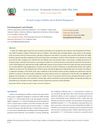 77 citations,
July 2020 in “Journal of the European Academy of Dermatology and Venereology”
77 citations,
July 2020 in “Journal of the European Academy of Dermatology and Venereology” Environmental factors, hormones, nutrition, and stress all significantly affect skin health and aging.
 70 citations,
August 1995 in “Fertility and Sterility”
70 citations,
August 1995 in “Fertility and Sterility” Finasteride reduces hairiness and androgen levels in women with unexplained excessive hair growth.
 67 citations,
June 2018 in “Engineering in Life Sciences”
67 citations,
June 2018 in “Engineering in Life Sciences” Plant cell culture is a promising method for creating sustainable and high-quality cosmetic ingredients.
[object Object]  63 citations,
March 1995 in “International Journal of Dermatology”
63 citations,
March 1995 in “International Journal of Dermatology” Some drugs can cause hair loss, and stopping these drugs often leads to hair regrowth.
 29 citations,
November 2013 in “Expert Review of Dermatology”
29 citations,
November 2013 in “Expert Review of Dermatology” Sensitive skin often causes discomfort, affects many people, especially women and older adults, and should be managed with careful product selection.
 29 citations,
January 1993 in “Dermatologic Clinics”
29 citations,
January 1993 in “Dermatologic Clinics” Certain medications and maintaining adequate iron levels can help manage women's hair loss.
 27 citations,
January 2002 in “Exogenous Dermatology”
27 citations,
January 2002 in “Exogenous Dermatology” Chronic exposure to sunlight may worsen male pattern baldness and protecting the scalp from the sun could slow it down.
 26 citations,
February 2002 in “Urologic clinics of North America”
26 citations,
February 2002 in “Urologic clinics of North America” The document concludes that it's important to understand the placebo effect when evaluating the effectiveness of treatments in medical trials.
 23 citations,
December 2004 in “Differentiation”
23 citations,
December 2004 in “Differentiation” Sex hormones affect hair and feather growth and may help manage alopecia and hormone-dependent cancers.
 21 citations,
June 2020 in “Dermatologic Therapy”
21 citations,
June 2020 in “Dermatologic Therapy” The COVID-19 pandemic led to fewer dermatology visits and changed the types of skin conditions patients experienced.
 17 citations,
January 2013 in “Our Dermatology Online”
17 citations,
January 2013 in “Our Dermatology Online” Dutasteride mesotherapy helps treat male hair loss but may harm sperm and sexual function.
 16 citations,
September 2018 in “Journal of Ethnopharmacology”
16 citations,
September 2018 in “Journal of Ethnopharmacology” Plant-based remedies may treat hair loss by reducing inflammation and improving insulin resistance.
 14 citations,
October 2020 in “Natural Products and Bioprospecting”
14 citations,
October 2020 in “Natural Products and Bioprospecting” Various treatments, including FDA-approved drugs, natural products, and oral supplements, can help with hair loss, but a patient's medical history and potential allergies should be considered when choosing a treatment.
 11 citations,
November 2021 in “BMJ Open”
11 citations,
November 2021 in “BMJ Open” People with alopecia areata have higher rates of mental health issues, autoimmune diseases, and infections.
 11 citations,
January 2011 in “Turkish Journal of Medical Sciences”
11 citations,
January 2011 in “Turkish Journal of Medical Sciences” Low iron levels are a significant risk factor for hair loss, while high vitamin D levels might be a response to hair loss, not a cause.
[object Object]  10 citations,
April 2013 in “Veterinary dermatology”
10 citations,
April 2013 in “Veterinary dermatology” A new skin disease in four Labrador retrievers responded well to immunosuppressive treatment.
 9 citations,
July 2020 in “Experimental Dermatology”
9 citations,
July 2020 in “Experimental Dermatology” Topical L-thyroxine may help with wound healing and hair growth but should be used short-term due to potential risks.
 7 citations,
July 2021 in “Molecules/Molecules online/Molecules annual”
7 citations,
July 2021 in “Molecules/Molecules online/Molecules annual” The method can measure vitamin B3 levels in human hair accurately.
 4 citations,
April 2010 in “Expert review of dermatology”
4 citations,
April 2010 in “Expert review of dermatology” Restoring immune privilege in hair follicles could help treat certain types of hair loss.
 2 citations,
May 2022 in “Ethnobotany research and applications”
2 citations,
May 2022 in “Ethnobotany research and applications” Traditional medicinal plants are still widely used and could help local development and inter-ethnic relationships.
 June 2024 in “Al- Anbar Medical Journal”
June 2024 in “Al- Anbar Medical Journal” Acute telogen effluvium can be resolved by addressing causes, but chronic telogen effluvium is harder to treat.
 October 2023 in “Animal production science”
October 2023 in “Animal production science” Vitamin A deficiency changes cattle hair structure, while pregnancy may improve it, suggesting hair can indicate cattle health.
 July 2023 in “The Egyptian Journal of Hospital Medicine ”
July 2023 in “The Egyptian Journal of Hospital Medicine ” The conclusion is that emotional support and a variety of treatments are important for alopecia areata, but more research is needed.
 January 2023 in “Acta dermatovenerologica Alpina, Pannonica et Adriatica (Tiskana izd.)”
January 2023 in “Acta dermatovenerologica Alpina, Pannonica et Adriatica (Tiskana izd.)” The article concludes that schoolchildren and adolescents experienced various skin issues during the COVID-19 pandemic, including acne from masks and other skin reactions from the virus and vaccines.
 June 2022 in “Veterinary evidence”
June 2022 in “Veterinary evidence” Clomipramine alone does not reduce overgrooming in cats with psychogenic alopecia.
 October 2020 in “Ayurline: international journal of research in indian medicine”
October 2020 in “Ayurline: international journal of research in indian medicine” Poor quality hair products contribute to premature greying in children.
 May 1993 in “Current problems in dermatology”
May 1993 in “Current problems in dermatology” Skin symptoms are important for diagnosing infections in children.
 January 2024 in “International journal of pharmaceutical sciences review and research”
January 2024 in “International journal of pharmaceutical sciences review and research” Indian jujube has many medicinal properties and can help treat ailments like diabetes, inflammation, and cancer.
 August 2023 in “Acta Scientific Veterinary Sciences”
August 2023 in “Acta Scientific Veterinary Sciences” Ivermectin, Vimeral syrup, and Benzyl Benzoate effectively treat sarcoptic mange in rabbits.
 July 2017 in “The American Journal of Cosmetic Surgery”
July 2017 in “The American Journal of Cosmetic Surgery” A patient's hair loss after a browlift surgery improved on its own over 8 months.






























